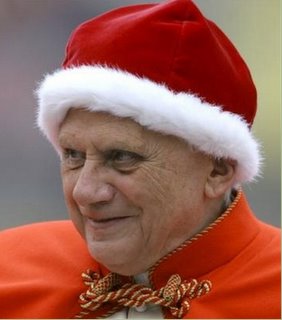Return of the Camauro

This is really most encouraging! It's not that I like the Pope to dress up, although I have nothing against that. This is wonderful because it shows how fearless Benedict XVI is, how heedless of 'what people may think'. It shows how attached he is to tradition, and how willing he is to revive it. It shows he is not just a thinker, a theorist, but also a doer, a man of action. People said: The ermine mozzetta will never be seen again; and it was. Then they said: Alright, but never the camauro, surely? Now what are people saying? The Old Mass in St Peter's? At this point it would be very foolish to count anything out. This Pope is simply wonderful. Alleluia!
